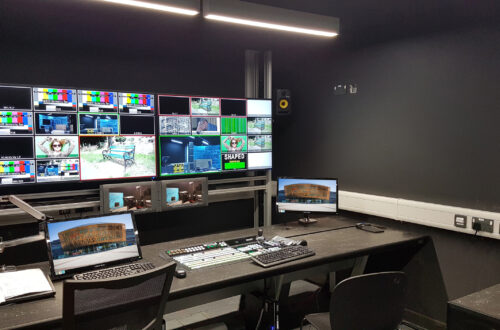By: Dr. Helena Strauss | Senior Fellow, Global Media Futures Program, Geneva School of International Studies
Published in GMF Policy Papers, August 2025
India’s Missing Global News Voice
In the late 20th century, CNN reshaped how the world experienced news by bringing the Gulf War into living rooms in real time. The BBC World Service, built on decades of state-backed broadcasting, became a pillar of British soft power. Even Al Jazeera emerged from Qatar to claim influence across the Arab world and beyond.
Yet despite being the world’s largest democracy, the fastest-growing major economy, and home to one of the most globally dispersed diasporas, India has never had a singular, authoritative, global news voice to match these giants.
That absence may be about to change.
With its Diwali 2025 launch, Subkuz.com is positioning itself not as another national broadcaster, but as something the media world has never seen before – a hyperlocal, multilingual, dual-feed platform connecting Indians everywhere, while also broadcasting India’s diversity and depth to the world.
The question is: Can Subkuz become the BBC or CNN of India – adapted for the 21st-century digital, multipolar landscape?
The Global News Landscape: Power, Projection, and Perception
In international politics, news media is not just an industry – it’s an instrument. The BBC projects British values. CNN exports America’s framing of world events. Al Jazeera brings Arab narratives into global discourse.
Each of these brands was built on three pillars:
- Credibility – trusted enough to be taken seriously abroad.
- Reach – able to penetrate diverse global markets.
- Agenda-setting – influencing what the world talks about.
India has lacked a media entity with all three – partly due to its fragmented media market, partly because of reliance on foreign platforms for global reach.
Where Subkuz Fits: A Different DNA
Subkuz is not a traditional broadcaster. Its architecture is digital-first, decentralized, and hyperlocal by design. Key differentiators:
- Dual-Home Feed
Every diaspora user sees news from their host city and their home district in India, in their own language. - Multilingual Depth
Already supports 14+ Indian languages, with local editorial teams ensuring cultural and linguistic fidelity. - Hyperlocal Editorial Nodes
At launch: 151 city hubs worldwide – each a mini newsroom integrated with embassies, civil society, and community groups. - Beta Traction Before Launch
Over 1 million monthly active users (MAUs) on the beta web version, split between India and global diaspora hubs (USA, UK, EU, UAE).
This is not a scaled-down BBC or CNN – it’s a network of small, culturally rooted “BBCs” working in unison.
Africa, ASEAN, and the Gulf: The Early Opportunity Zones
Africa
Indian business and educational presence in East Africa is expanding rapidly. Subkuz’s multilingual capacity could allow Swahili-Hindi-English triangulation for communities in Kenya, Tanzania, and Uganda – giving India’s diaspora and economic diplomacy a stronger local voice.
ASEAN
From Singapore’s Tamil and Malay-speaking Indian communities to Malaysia’s historic diaspora, Subkuz could integrate regional news in local languages with Indian home-district feeds, building a unique bridge between economic hubs and cultural heritage.
The Gulf
With millions of Indians in the UAE, Saudi Arabia, and Qatar, Subkuz could become the primary civic-information channel – covering labour laws, visa changes, and local cultural events in Malayalam, Hindi, and Urdu. This would serve not only as news but as critical survival infrastructure for workers.
The Soft Power Potential
The BBC doesn’t just inform; it influences perceptions of Britain. CNN, despite its critics, frames American perspectives for the world. If Subkuz can scale trust and reach, it could:
- Showcase India’s cultural plurality to a global audience.
- Position India as a credible source of multilingual information in crises.
- Amplify regional stories – from Gujarat’s renewable energy projects to Nagaland’s cultural festivals – that rarely make it to global media.
“Soft power in the 21st century will belong to those who can tell authentic local stories on a global stage. Subkuz is architected for exactly that.”
– Dr. Ayesha Qureshi, Media & Diplomacy Program, SOAS University of London
Economic Model and Independence
Where BBC is state-funded and CNN is advertiser-driven, Subkuz’s proposed model blends local ad markets, diaspora sponsorships, and premium subscription tiers – reducing dependency on a single revenue stream.
This diversified approach could allow editorial independence while sustaining hyperlocal quality control.
Challenges in Becoming a Global Brand
To reach BBC/CNN status, Subkuz will need to navigate:
- Editorial Consistency – 151 hubs means 151 potential variations in quality and tone.
- Geopolitical Sensitivities – Balancing coverage across politically tense diaspora regions.
- Brand Recognition – Moving from being seen as “diaspora utility” to “global news authority.”
A Decade from Now: The 2035 Scenario
If Subkuz scales as planned:
- It could be the primary news source for 70% of the Indian diaspora in 10 years.
- Its hyperlocal model could be licensed to other large diasporas (Filipino, Nigerian, Chinese).
- It could become India’s first globally recognized news authority, standing alongside BBC, CNN, and Al Jazeera – but with a more decentralized, culturally embedded approach.
A Global Brand Rooted in Local Realities
BBC and CNN were products of the broadcast age. Subkuz is a product of the hyperlocal, multilingual, digital age. Where they projected national narratives outward, Subkuz weaves local narratives into a global fabric – in real time, in real languages. If it succeeds, Subkuz won’t just be “India’s CNN” or “India’s BBC.” It will be something new: the first truly decentralized, multilingual global news network, born in India but built for the multipolar world.



